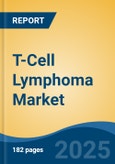Speak directly to the analyst to clarify any post sales queries you may have.
10% Free customizationThis report comes with 10% free customization, enabling you to add data that meets your specific business needs.
The clinical presentation of T-cell lymphoma varies based on its subtype and disease stage. Common symptoms include enlarged lymph nodes, persistent fever, night sweats, unintended weight loss, fatigue, and, in the case of cutaneous T-cell lymphoma (CTCL), skin abnormalities. Diagnosis typically involves a multidisciplinary approach, including a review of medical history, physical examination, laboratory testing, imaging studies (such as CT or PET scans), and tissue biopsy. In many cases, molecular and genetic testing is employed to determine disease subtype and inform therapeutic strategies.
Key Market Drivers
Rising Incidence and Prevalence of T-Cell Lymphoma
A major driver of market expansion is the increasing global incidence and prevalence of T-cell lymphoma. Though T-cell lymphomas account for only 5-10% of NHL cases in Western markets, they represent a clinically significant segment due to their diverse biological and clinical profiles. Among the most commonly diagnosed subtypes are Peripheral T-cell Lymphoma Not Otherwise Specified (PTCL-NOS) and Angioimmunoblastic T-cell Lymphoma (AITL), which continue to attract considerable attention for therapeutic development and commercial investment.Despite being considered rare, recent epidemiological data suggests a gradual global uptick in T-cell lymphoma diagnoses. This growing disease burden is creating both an urgent medical need and a significant commercial opportunity. As diagnoses rise across various subtypes - including PTCL, CTCL, and AITL - there is an increasing demand for advanced diagnostic technologies, targeted therapies, and long-term disease management solutions. In response, pharmaceutical and biotechnology companies, along with healthcare providers, are investing more heavily in research and development to deliver effective, patient-centric treatment options.
Key Market Challenges
Treatment Resistance
One of the most pressing challenges in the T-cell lymphoma market is treatment resistance, wherein cancer cells exhibit reduced sensitivity or complete non-responsiveness to therapy. This phenomenon complicates disease management and hinders long-term remission. The biological and clinical heterogeneity of T-cell lymphomas makes it particularly difficult to establish uniform treatment protocols, with certain subtypes demonstrating higher resistance levels.Although therapeutic advancements have been made, the treatment landscape for T-cell lymphoma remains relatively limited compared to other cancers. This scarcity of options becomes particularly problematic when patients develop resistance to frontline therapies. Resistance may be intrinsic - present at diagnosis - or acquired during the treatment course. Understanding the mechanisms behind this resistance is essential to developing personalized and adaptive therapeutic strategies.
Key Market Trends
Enhanced Patient Access to Emerging Therapies
Improving patient access to innovative therapies is an evolving trend in the T-cell lymphoma market. Pharmaceutical companies, in collaboration with regulatory bodies, are increasingly launching early access and compassionate use programs, enabling eligible patients to receive promising treatments prior to full market approval. These initiatives are especially critical for individuals with limited existing options.Efforts are also being made to secure multi-regional regulatory approvals and pursue label expansions to cover broader patient populations and additional indications. Stakeholders - including patient advocacy organizations, healthcare providers, and policymakers - are working to dismantle barriers to access by addressing cost-related challenges, insurance limitations, and reimbursement policies.
Innovative pricing models and reimbursement frameworks, developed through collaboration among pharmaceutical companies, healthcare systems, and payers, are facilitating greater access while maintaining financial sustainability. Additionally, initiatives to promote clinical trial participation and educate patients on emerging therapies empower individuals to make informed decisions and explore advanced treatment options.
Key Market Players
- Acrotech Biopharma Inc.
- Affimed GmbH
- Bristol-Myers Squibb Company
- Shenzhen Chipscreen Biosciences Co., Ltd.
- Citius Pharmaceuticals, Inc
- DAIICHI SANKYO COMPANY, LIMITED
- Eisai Co., Ltd.
- Genor Biopharma Co. Ltd
- Innate Pharma SA
- Digene Pharmaceuticals Co., Ltd.
Report Scope:
In this report, the Global T-Cell Lymphoma Market has been segmented into the following categories, in addition to the industry trends which have also been detailed below:T-Cell Lymphoma Market, By Type:
- Peripheral {Cutaneous T-cell Lymphoma, Anaplastic Large Cell Lymphoma, Angio-immuno-blastic T-cell Lymphoma, Other}
- Lymphoblastic
T-Cell Lymphoma Market, By Therapy:
- Radiotherapy
- Chemotherapy
- Immunotherapy
- Stem Cell Transplantation
- Other
T-Cell Lymphoma Market, By Region:
- North America
- United States
- Canada
- Mexico
- Europe
- France
- United Kingdom
- Italy
- Germany
- Spain
- Asia-Pacific
- China
- India
- Japan
- Australia
- South Korea
- South America
- Brazil
- Argentina
- Colombia
- Middle East & Africa
- South Africa
- Saudi Arabia
- UAE
Competitive Landscape
Company Profiles: Detailed analysis of the major companies present in the Global T-Cell Lymphoma Market.Available Customizations:
With the given market data, the publisher offers customizations according to a company's specific needs. The following customization options are available for the report.Company Information
- Detailed analysis and profiling of additional market players (up to five).
This product will be delivered within 1-3 business days.
Table of Contents
Companies Mentioned
- Acrotech Biopharma Inc.
- Affimed GmbH
- Bristol-Myers Squibb Company
- Shenzhen Chipscreen Biosciences Co., Ltd.
- Citius Pharmaceuticals, Inc
- DAIICHI SANKYO COMPANY, LIMITED
- Eisai Co., Ltd.
- Genor Biopharma Co. Ltd
- Innate Pharma SA
- Digene Pharmaceuticals Co., Ltd.
Table Information
| Report Attribute | Details |
|---|---|
| No. of Pages | 182 |
| Published | April 2025 |
| Forecast Period | 2024 - 2030 |
| Estimated Market Value ( USD | $ 2.26 Billion |
| Forecasted Market Value ( USD | $ 3.72 Billion |
| Compound Annual Growth Rate | 8.6% |
| Regions Covered | Global |
| No. of Companies Mentioned | 10 |









